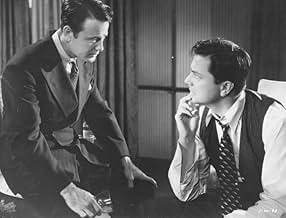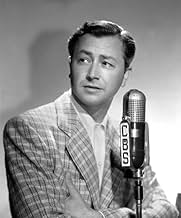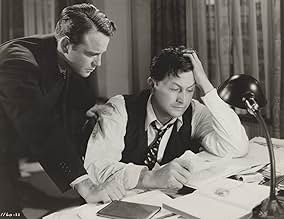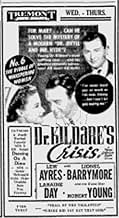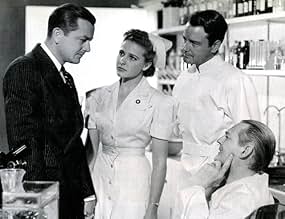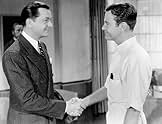IMDb RATING
6.2/10
438
YOUR RATING
Nurse Mary Lamont is excited about her brother's impending visit. The young man's strange behavior puzzles Dr. Kildare who believes he may be hiding a serious illness.Nurse Mary Lamont is excited about her brother's impending visit. The young man's strange behavior puzzles Dr. Kildare who believes he may be hiding a serious illness.Nurse Mary Lamont is excited about her brother's impending visit. The young man's strange behavior puzzles Dr. Kildare who believes he may be hiding a serious illness.
Horace McMahon
- Foghorn Murphy
- (as Horace MacMahon)
Eddie Acuff
- Clifford Genet - Window Cleaner
- (uncredited)
Ernie Alexander
- Assistant Bed Salesman
- (uncredited)
Charles Arnt
- Mr. Stubbins - Man with Pain
- (uncredited)
Tom Collins
- Doctor
- (uncredited)
Featured reviews
Dr. K, Dr. Gillespie, and nurse Mary are all involved in "Dr. Kildare's Crisis," a 1940 "Dr. Kildare" film which stars regulars Lew Ayres as Kildare, Laraine Day as Mary, Lionel Barrymore as Dr. Gillepsie, Alma Kruger as the nursing supervisor. Robert Young appears as Mary's brother Doug.
Kildare and Mary are planning their wedding when Douglas comes to visit. He has a plan to help unskilled labor become skilled, and needs the support of one of Kildare's grateful ex-patients.
Unfortunately it's downhill from there, due to a very weak script. Kildare, without examining Mary's brother, decides he has epilepsy on the basis that Douglas sometimes seems to hear noises no one else hears.
This makes Mary afraid to marry Kildare for fear of having him end up with a sick wife or epileptic children. She becomes hysterical and wants to return home with her brother.
Well, this plot line is so pathetic that the New York Medical Society wrote a letter in protest about the way epilepsy is treated in the film - that it's curable, that it can be inherited, and that it can lead to insanity.
Also, how could Mary, a trained nurse, go so crazy and insist on dumping Kildare, whom she's been chasing for years? Really preposterous behavior on the part of the characters. The audience knows them by now and it's pretty bewildering.
The series would be over in 1942 and become the "Dr. Gillespie" series, which retained Barrymore and Alma Kruger. Lew Ayres was persona non grata for being a conscientious objector in World War II, though he did work on the front lines as a medic. MGM didn't care, they just wanted to be rid of him.
When he returned from the war, the handsome Ayres did some of his best work, receiving an Oscar nomination for "Johnny Belinda," and continuing his career until 1994.
Laraine Day, though MGM never seemed to know what to do with her,(happily, she was loaned out a lot) is lovely as Mary, and of course, due to her involvement with Kildare, Mary becomes a casualty in this series.
Dr. Gillespie, starring in his own movie series, would mellow. Both the Kildare and Gillespie series were very popular. It's a shame that this film seems so out of place.
Kildare and Mary are planning their wedding when Douglas comes to visit. He has a plan to help unskilled labor become skilled, and needs the support of one of Kildare's grateful ex-patients.
Unfortunately it's downhill from there, due to a very weak script. Kildare, without examining Mary's brother, decides he has epilepsy on the basis that Douglas sometimes seems to hear noises no one else hears.
This makes Mary afraid to marry Kildare for fear of having him end up with a sick wife or epileptic children. She becomes hysterical and wants to return home with her brother.
Well, this plot line is so pathetic that the New York Medical Society wrote a letter in protest about the way epilepsy is treated in the film - that it's curable, that it can be inherited, and that it can lead to insanity.
Also, how could Mary, a trained nurse, go so crazy and insist on dumping Kildare, whom she's been chasing for years? Really preposterous behavior on the part of the characters. The audience knows them by now and it's pretty bewildering.
The series would be over in 1942 and become the "Dr. Gillespie" series, which retained Barrymore and Alma Kruger. Lew Ayres was persona non grata for being a conscientious objector in World War II, though he did work on the front lines as a medic. MGM didn't care, they just wanted to be rid of him.
When he returned from the war, the handsome Ayres did some of his best work, receiving an Oscar nomination for "Johnny Belinda," and continuing his career until 1994.
Laraine Day, though MGM never seemed to know what to do with her,(happily, she was loaned out a lot) is lovely as Mary, and of course, due to her involvement with Kildare, Mary becomes a casualty in this series.
Dr. Gillespie, starring in his own movie series, would mellow. Both the Kildare and Gillespie series were very popular. It's a shame that this film seems so out of place.
Thanks to Turner Classic Movies, I have been enjoying the series, never having seen them before. The Dr. Kildare series was the precursor of shows like Medical Center, Marcus Welby, M*A*S*H*, ER, and Grey's Anatomy, and a slew of other shows I am sure as well.
I found this series entry to be worth viewing. Another reviewer made some valid points about the weakness of some character motivations, but I still can see why Mary could react the way she does when discovering the truth, which Jimmy Kildare has kept from her.
Robert Young turns in an excellent performance as Mary's brother, proving how versatile an actor he was. He wasn't always the boring and stable father from Father Knows Best (and later on becoming the Dr. Welby mentioned above).
We learn a bit more about Dr. Gillespie's past; he had a brother who died. We also learn a bit more about how and why he feels special towards Molly Byrd.
Overall, another entry worth watching and enjoying.
I found this series entry to be worth viewing. Another reviewer made some valid points about the weakness of some character motivations, but I still can see why Mary could react the way she does when discovering the truth, which Jimmy Kildare has kept from her.
Robert Young turns in an excellent performance as Mary's brother, proving how versatile an actor he was. He wasn't always the boring and stable father from Father Knows Best (and later on becoming the Dr. Welby mentioned above).
We learn a bit more about Dr. Gillespie's past; he had a brother who died. We also learn a bit more about how and why he feels special towards Molly Byrd.
Overall, another entry worth watching and enjoying.
Some other crisis, rather than suspecting "epilepsy" as the cause of Robert Young's erratic behavior, would have made more sense. Having Lew Ayres decide, on some vague notion that Laraine Day's brother (Robert Young) has epilepsy and might be passing it on to her, doesn't make much sense. Then too, her hysterical fears (as a nurse) are unsubstantiated by reasons given in the script.
I must admit that these negatives, however, do not mean that "Dr. Kildare's Crisis" is not an uninteresting film. Indeed, it's so well acted by the leads that it's apparent they were ready for headier stuff, acting-wise. Laraine Day is so impressive as Nurse Mary Lamont that it's a wonder MGM didn't build a better career for her during her studio contract. She's not only extremely attractive but does a decent job in a role that's not particularly well conceived.
Robert Young does nicely with some starkly dramatic moments, proving that this MGM series was a good training ground for their young contract players. No surprise that better roles would lie ahead for Ayres and Young. Miss Day would have to wait until she left the studio for better assignments.
Lionel Barrymore is his usual grumpy and sometimes obnoxious self as Dr. Gillespie, using all of his well-known mannerisms and then some.
But for a drama dealing with medical terms and hospital life, the epilepsy angle is badly handled and factually incorrect both as to treatment and diagnosis.
Summing up: As it is, this is formula stuff--some romance, some light moments and then some darker elements before the windup with Ayres emerging as a heroic doctor.
I must admit that these negatives, however, do not mean that "Dr. Kildare's Crisis" is not an uninteresting film. Indeed, it's so well acted by the leads that it's apparent they were ready for headier stuff, acting-wise. Laraine Day is so impressive as Nurse Mary Lamont that it's a wonder MGM didn't build a better career for her during her studio contract. She's not only extremely attractive but does a decent job in a role that's not particularly well conceived.
Robert Young does nicely with some starkly dramatic moments, proving that this MGM series was a good training ground for their young contract players. No surprise that better roles would lie ahead for Ayres and Young. Miss Day would have to wait until she left the studio for better assignments.
Lionel Barrymore is his usual grumpy and sometimes obnoxious self as Dr. Gillespie, using all of his well-known mannerisms and then some.
But for a drama dealing with medical terms and hospital life, the epilepsy angle is badly handled and factually incorrect both as to treatment and diagnosis.
Summing up: As it is, this is formula stuff--some romance, some light moments and then some darker elements before the windup with Ayres emerging as a heroic doctor.
The wedding of Dr. Kildare and nurse Mary Lamont is fast approaching, and Mary's brother, Doug (Robert Young) has come for a visit. He has drawn up plans for a philanthropic concern that needs the backing of a rich person, and so he has come to New York for two reasons - to meet his future brother-in-law and also to ask Dr. Kildare to introduce him to a rich man who is indebted to Kildare. During the visit, Kildare notices that Doug seems to be hearing things followed by a period of extreme energy and confidence. For reasons that are beyond me, Kildare thinks that this behavior could amount to some dread disease and won't stop until he uncovers said dread disease. Complications ensue.
The disease that is suspected is epilepsy, and as with most illnesses mentioned in this series, it is given an excessively bad rap. It is said it leads to insanity unless the person lives a very calm uneventful existence, it is said that the person eventually becomes an invalid, and because it is often inherited, it could mean that Mary has it too. But wait, wouldn't that mean that their parents would have it too, that it wouldn't just suddenly crop up in Doug and Mary? This is never mentioned.
So the diagnostic/treatment portion of this film is a bit of a mess, but then I'd expect that from a film that is 85 years old. The entries on melanoma and diabetes were all wrong medically too, but they were still enjoyable films. The key to its enjoyability is the consistency of the supporting characters - Molly Bird, Nat Pendleton as lovable but strong as an ox Joe, Nell Craig as the persistently terrified Nurse Parker, and Marie Blake as Sally the hospital receptionist and switchboard operator.
The disease that is suspected is epilepsy, and as with most illnesses mentioned in this series, it is given an excessively bad rap. It is said it leads to insanity unless the person lives a very calm uneventful existence, it is said that the person eventually becomes an invalid, and because it is often inherited, it could mean that Mary has it too. But wait, wouldn't that mean that their parents would have it too, that it wouldn't just suddenly crop up in Doug and Mary? This is never mentioned.
So the diagnostic/treatment portion of this film is a bit of a mess, but then I'd expect that from a film that is 85 years old. The entries on melanoma and diabetes were all wrong medically too, but they were still enjoyable films. The key to its enjoyability is the consistency of the supporting characters - Molly Bird, Nat Pendleton as lovable but strong as an ox Joe, Nell Craig as the persistently terrified Nurse Parker, and Marie Blake as Sally the hospital receptionist and switchboard operator.
Marriage proposals are spreading in the hospital. Doctor James Kildare (Lew Ayres) proposes to nurse Mary Lamont (Laraine Day). Mary's brother Douglas (Robert Young) comes for a visit. He is looking for a patron for his charity from one of Kildare's former patient. Kildare has concerns for his health. Dr. Leonard Gillespie (Lionel Barrymore) remains the irascible mentor.
This is another Kildare episode. The war would eventually disrupt the series, but not yet. This is still a series with some juice and the characters remain. The medical aspect is a bit suspect in this one. I'm no doctor and I'm certainly no expert with medical care at this time. That part seems like the weakest link although nurse Lamont's reaction is a close second. She is very melodramatic. I slowly grew frustrated with her. Well, she is part of the crisis.
This is another Kildare episode. The war would eventually disrupt the series, but not yet. This is still a series with some juice and the characters remain. The medical aspect is a bit suspect in this one. I'm no doctor and I'm certainly no expert with medical care at this time. That part seems like the weakest link although nurse Lamont's reaction is a close second. She is very melodramatic. I slowly grew frustrated with her. Well, she is part of the crisis.
Did you know
- TriviaThe Medical Society of New York wrote a letter to the PCA protesting the way epilepsy was presented in the movie. They objected to the claims that epilepsy is inherited, that it is curable and that it leads to insanity.
- GoofsWhen Dr Gillispie finishes reading the note from Mary, he says "Fine girl, that Mary" and puts the note on his desk with a thump, and with the next cut, it immediately appears in Dr. Kildare's hands.
- Quotes
Douglas 'Doug' Lamont: [on a prescribed treatment plan] Suppose I decide it isn't worth it?
Dr. James 'Jimmy' Kildare: Well, then you face a gradual disintegration of the brain, probable insanity, and a wretched living death.
- ConnectionsFollowed by The People vs. Dr. Kildare (1941)
Details
- Runtime1 hour 15 minutes
- Color
- Aspect ratio
- 1.37 : 1
Contribute to this page
Suggest an edit or add missing content

Top Gap
By what name was Les Soupçons du docteur Kildare (1940) officially released in India in English?
Answer
